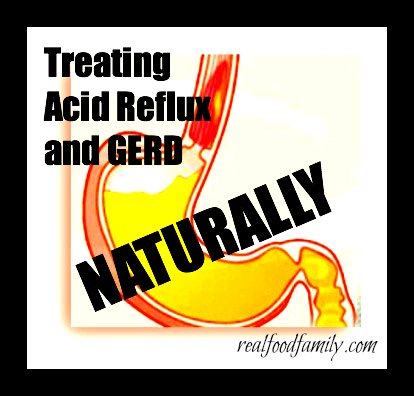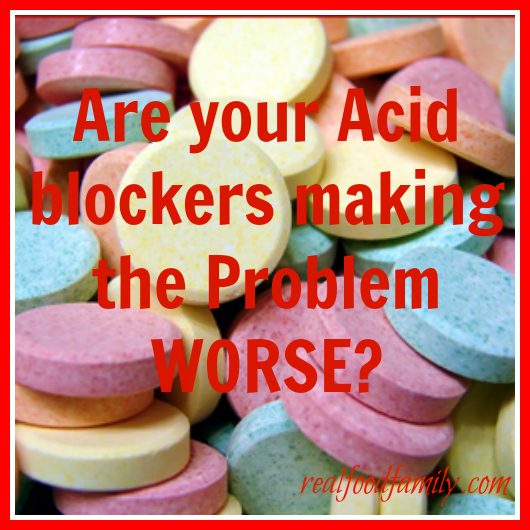I found a great new Food Channel show that I’ve started writing reviews on and offering my perspective and comments.
This time around, we’re talking about Acid Reflux and GERD (Gastroesophageal Reflux Disease).
This is one of the most common digestive issues I address in my clinical practice, and I am convinced that it is because of our highly processed Western diet. Sadly, we treat this issue with medications that worsen the problem instead of fix it. The quick-fix of acid blocking medications can result in serious side effects and health disorders. At the same time, untreated GERD can have long-term effects and even lead to cancer if not treated. Fortunately there are many options we have to address this issue with food and other natural therapies instead of the drugs.
In this particular episode of Food Hospital, they helped a middle-aged woman who was a singer in a rock band. She suffered from such bad acid reflux that she would have bouts of involuntary projectile vomiting…particularly worrisome for the stage performer. The woman also had undergone many surgeries to help fix the burning and inflammed epithelium, or lining of the esophagus.
GERD, often termed Acid Reflux, is medically considered an issue of high stomach acid content mixed with a stomach valve (esophageal sphincter) that doesn’t close properly and so acid easily “sloshes” up into the esophagus and even into the mouth. This volatile stomach acid damages any body tissue in its path.
The show had a cool experiment where they put an aluminum ring in a jar with hydrochloric acid diluted enough to mimic the pH level of stomach acid, and after a few hours the aluminum ring had dissolved into nothing.
Things that can stress or stimulate reflux include drinking alcohol and eating large meals, especially before bed. Caffeine and fried fatty foods can also irritate the GERD patient.
In this Food Hospital episode, the nutritionist emphasized eliminating life and dietary stressors, then repairing the damage with foods like:
- sweet potato
- squash
- brocolli
- spinach
- berries
- tomatoes
- nuts
- whole grains
Finally, they also emphasized the need for foods high in anti-oxidants to counteract the damage done by the acid in the esophagus and throat.
My comments

Hypochlorhydria is the most common symptom I see in my practice.
Hypochlorhydria (LOW stomach acid) is actually the underlying cause of GERD and reflux problems, not hyperchlorhydria (HIGH stomach acid).
Even if my clients do not suffer from “heartburn”, they almost always have many other symptoms of hypochlorhydria. It is actually very rare for someone, especially someone eating a standard American (or Western) diet, to be producing too much stomach acid.
Because of commercials and erroneous “doctor shows” on television, as well as prescription-happy and uneducated doctors, most misinformed people suffering from heartburn, reflux, and other gastro-intestinal problems insist that they have too much acid and that their prescription medications are necessary.
Usually with my clients I will discuss with them why I believe they, in fact, have too little stomach acid, I explain the many other symptoms associated with hydrochlorhydria:
- gas
- bloating
- belching
- constipation
- acne
- liver problems
- muscular and skeletal problems
- dental decay, cavities and infections
- frequent nausea
- food allergies
- mineral deficiencies- particularly iron, calcium, magnesium and potassium
- undigested food in stool
- difficulty digesting meat
- frequent illness
- parasitic infections or vulnerability to parasitic or bacterial infections (particularly food-borne)
Honestly the list goes ON and ON! This is SUCH an important issue!!!
The more serious conditions associated with hypochlorhydria may include:
- Asthma
- Celiac disease
- Chronic fatigue syndrome (CFS)
- Diabetes melitis
- Eczema
- HIV/AIDS
- Lupus
- Macular degeneration
- Multiple chemical sensitivity
- Pernicious anaemia
- Psoriasis
- Reflux
- Rheumatoid arthritis
- Rosacea
- Stomach ulcers/helicobacter pylori
- Urticaria (hives)
- Vitiligo
YIKES!!!
If people truly had too much stomach acid, many of these other symptoms would not (or could not) exist.
At this point my clients may start to listen but are usually still skeptical. Next I will palpate their stomach acid reflex points, which are usually super tender. More often then not, they are are still skeptical. It’s understandable, though, because people just can’t stomach the idea of letting go of their acid-blockers. (Pun totally intended.)
Finally, if I think it’s safe*, I send my clients home with a little baggie of HCl therapy tablets. This is how I prove to them that they actually need MORE acid in their stomach to address their problems. They are to sit down to a large meal. Half-way through the meal they should take an HCl tablet. They continue eating their meal, taking another tablet every 3-5 minutes. Once they start to feel a little burning- like heartburn- they know they needed that much added HCl to create a TRUE excess of stomach acid. They needed one less tablet than how many they took to create proper stomach pH balance. Their treatment is to start taking that many HCl tablets with every meal and hopefully as they change their diet and work with this therapy, they will start needing less of the tablets.
You can also get a similar effect by drinking apple cider vinegar diluted in water with meals. My only issue with this is that the vinegar can burn on the way down and even further damage a damaged esophagus, unlike the tablets.
*Safe hydrochloric acid therapy means that the esophagus and small intestine (and the sphincters into and out of each organ) are not inflamed or damaged. We don’t want hydrochloric acid touching internal wounds because it could make those wounds worse. Besides palpating or testing the reflex points for these organs, it is very difficult to determine if there is inflammation or wounds. I will usually send a client home with supplements that heal the gut and repair the mucosal lining of the small intestine first. After 4-8 weeks of that, we will start the hydrochloric acid supplement therapy.
This may all sound complex, but I assure you it is an easy therapy that is inexpensive and will truly change your overall health because stomach acid is SO IMPORTANT! It saddens me to think that people can’t even go a day without their acid-blocking medications, which make the problem WAY worse.
How do acid-blocking medications make the problem worse?

If your gastro-intestinal tract is like plumbing, then low stomach acid is like a drain clog that is still draining a little bit, but it is seriously impairing the sytem. That clog is collecting old, disgusting water and debris and damaging the pipes. That clog is also causing dirty water and gunk to back up into the tub (or sink, or toilet…you get the idea). What you need to fix this problem is something to breakdown that clog and flush it down. But your “drain doctor” tells you that the more important problem you need to fix is the dirty water and gunk damaging the pipes and backing up into the sink. So instead of getting rid of the clog, the “drain doctor” gives you a sort of drain glue to seal up the clog to make sure it doesn’t send dirty water and gunk up into the tub.
But what happens when you take another shower?! Well, I guess you just add more of the “drain glue” in there to keep the gunk from coming up again.
Do you see how this turns into a major problem? Not only is the “drain glue” not fixing the problem, but causing more damage to the pipes and exacerbating the cause of the problem- the clog! Sure, the drain glue is somehow fixing the symptom, but it’s making the cause of the problem WORSE!
When you have a backup in your stomach because there isn’t enough acid to break down food and get things moving to the next part of digestion, then you add even more food, then the food will putrefy and ferment, creating gases and stink that you just don’t want in there. After a while, the contents of your stomach will have 2 choices:
- push the partially-digested food up the esophagus
- push the partially-digested (rancid and putrefied) food down into the small intestine, causing problems all the way down
With option #1 you get heartburn, reflux, and even vomiting. With option #2 you get large food particles damaging the small intestine, causing all sorts of problems (like allergies, digestive disorders, and this can even exacerbate neurological disorders). Then, down the “road”, you get bloating, gas, constipation or diarrhea.
Then you ask your doctor to help and he gives you a medication to neutralize your stomach acid, or even block it completely, so that the backup doesn’t hurt so much (even though your stomach acid is too low, it is still too high to be touching the organs outside of the stomach). The acid-blockers will make you feel better, until you eat or drink again and need more of the medication and the cycle goes on and on (not a problem for that pharmaceutical company).
Not only do the medications exacerbate the problem they are supposed to fix, but they have side effects. Stomach acid is not only needed to break down food efficiently and burn up bacteria and parasites that you ingest, but it is also needed to properly absorb minerals from food. So if you block your stomach acid, you will not only have digestive problems and have difficulty fighting disease, but you will suffer from mineral-deficiency disorders.
So the Food Hospital show did a pretty good job- encouraging the elimination of processed foods and introduction of anti-oxidants. I think they just didn’t dive into the issue enough to help the public understand the problem. We are inundated with commercials for acid-blocking drugs. Patients tell their doctors that they need a reflux medication without even understanding the problem. Sadly, I don’t think many doctors even understand the real problem.
PS: Try these 5 Natural Remedies for Indigestion
This post is featured at THANK YOUR BODY’s Link-Up Thursdays.

